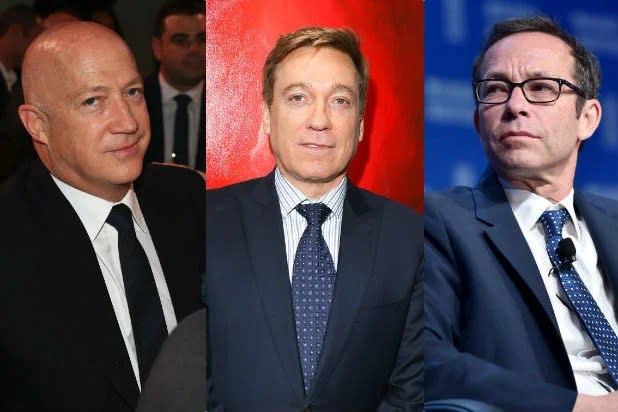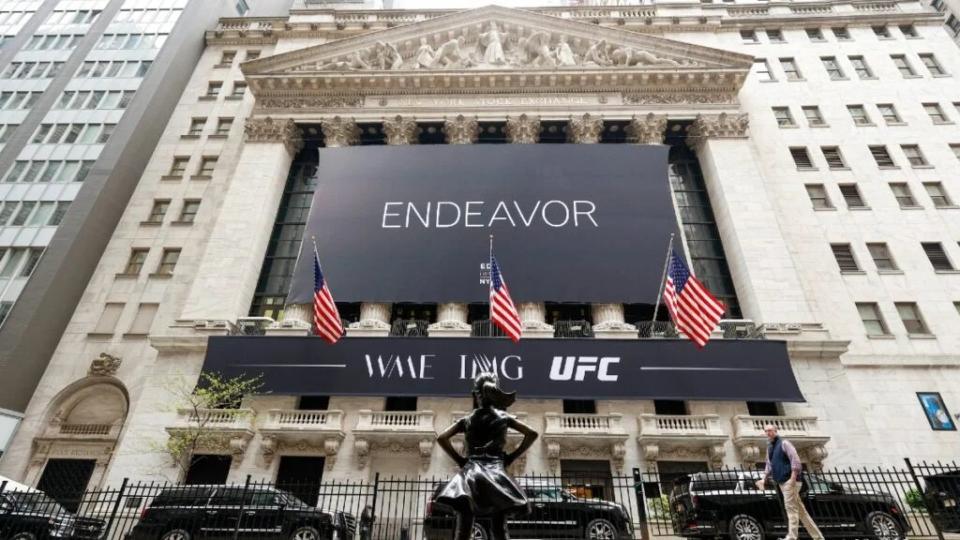Ari Emanuel, Bryan Lourd and the Feud of the Century
- Oops!Something went wrong.Please try again later.
- Oops!Something went wrong.Please try again later.
In the glitzy corridors of Hollywood, few rivalries burn as intensely as the one between superagents Ari Emanuel and Bryan Lourd.
But last week the longtime battle royal, which dates to Endeavor CEO Emanuel’s early move to poach a CAA star away from Lourd to Endeavor, hit a new low when it spilled into public at Bloomberg’s Screentime conference in Los Angeles.
Emanuel fired the first shot when he declared that Lourd and fellow CAA managing partner Kevin Huvane should temporarily step down due to a lawsuit filed by actress Julia Ormond against Weinstein, Disney and CAA. Her suit includes allegations of sexual harassment, battery and retaliation.
“You’re sitting in a situation that Kevin and Bryan are to Harvey Weinstein like Ghislaine Maxwell was to Jeffrey Epstein,” Emanuel said. “They were leading them in to this man. So what should happen with them is…they should take a leave of absence. This is the seventh time it’s been brought up about that agency.”
A day later at the same conference, Lourd fired back. “We all know Ari Emanuel to be an incredibly performative, erratic, and in my mind, always self-serving [person],” he said from the main stage.
“The idea that he, in any way, could say that he could hold himself out as morally superior to anyone, but specifically around the issues that are so challenging for women, is odd,” Lourd said.
Most people inside Hollywood’s corridors of power are so used to the feud that apparently nothing either agent says or does seems surprising anymore – even a comparison to a convicted rapist. No one seriously thought that Lourd and Huvane’s new boss, Artemis CEO Francois-Henri Pinault, would suspend and investigate his top executives.
But the sniping takes on a different tone now that both are CEOs and not merely rival agents vying for talent. They’re now bona fide corporate leaders atop a public company in one instance, and part of a high-profile, global luxury conglomerate in the other.
To many, the rivalry isn’t just getting old – it’s downright embarrassing.
No matter. Emanuel and Lourd’s moves to steer their dueling companies have become the epitome of entertainment warfare. Amidst the high-stakes drama of Tinseltown, the Emanuel/Lourd rivalry isn’t just notable, but legendary.
Their relentless moves don’t just dictate the future of their agencies; they’ve reshaped Hollywood’s entire landscape. Each move they make sends ripples through the industry, influencing box office hits, red carpet appearances and even the Oscars’ guest list.
While both have an impressive roster of A-list clients, it’s their pursuit of dealmaking dominance that has Hollywood insiders constantly on their toes, wondering what the next chapter will bring.
The reasons for their ongoing feud are complex and multifaceted, with some attributing it to professional jealousy and others to personal animosity. Whatever the root cause, the beef to define all beefs has taken on greater visibility since Endeavor’s IPO in 2021, the first time that the parent company of a major Hollywood talent agency has been publicly traded. And it takes on greater significance now that Artemis is the majority owner of CAA.
TheWrap reached out to both agencies for comment and both declined.
The origin of the beef
To understand how the rivalry started you would need to go back to 2001, when Emanuel’s startup agency Endeavor shocked Hollywood by poaching super agent Patrick Whitesell away from CAA. The move effectively set Endeavor on a trajectory to become the town’s biggest agency.
Whitesell, at the time, had an uber-hot client list that included Ben Affleck, Matt Damon, Christian Bale, Joaquin Phoenix, Drew Barrymore, Kate Hudson, Jessica Alba and Hugh Jackman, to name a few.
“Whitesell’s departure was truly seismic,” a top agent told TheWrap. “Whitesell had been groomed at CAA to be the next uber-agent, including giving him a number of Lourd’s star clients, so it was shocking when he left to go to small upstart [like] Endeavor.”
Endeavor emphasized the term “entrepreneurial” to both current and prospective clients, assuring them that they would not only receive job opportunities but also have companies created specifically for them. Endeavor successfully penetrated CAA’s television business and, with the addition of Whitesell, established a noteworthy presence in the motion picture business, with a client list that has only expanded over the years.
It wouldn’t be the first time a top agent would defect to Emanuel’s company. In early 2012, Christopher Nolan’s agent, Dan Aloni, left CAA for WME. Aloni, who had built a roster of top director clients at competing agency UTA, was a top earner for CAA. “I left because they fired me,” Aloni said in James Andrew Miller’s 2016 book, “Powerhouse: The Untold Story of Hollywood’s Creative Artists Agency.” “They tried to discredit me.”
“One of my proudest achievements is feeling I started a wave of change from CAA’s dominance by being the first person to leave and take major business away,” Aloni said. “Then others wanted to follow and took all of their business. Warren Zavala, then Stuart Manashil left and took all of their clients.” In 2021, another homegrown CAA agent, Elan Ruspoli, joined the WME ranks.
One WME insider suggested that Emanuel harbored resentment towards Lourd because Emanuel had to work hard to build his business, while Lourd and the others inherited theirs.
“They got handed the company,” Emanuel said in “Powerhouse,” adding that “they took over a huge company that had huge cash flow. Their only costs were manpower and fucking travel and dinner expenses.” That’s certainly a view not shared by CAA partners, who expanded the business and won back industry good will after the iron reign of Michael Ovitz.

In 2009, in a brazen act of war, Emanuel’s Endeavor merged with the William Morris Agency to form William Morris Endeavor (WME), with the sole mission to directly challenge CAA’s core values and principles.
“Here was the turning point, the very end for them: about six or seven years ago, Richard Lovett went out and said, ‘We’re going to represent everybody. We want 100 percent market share,'” Emanuel said in the book. “It was like he took Studio 54 at its height — when you couldn’t get in because it was so exclusive — and just said, ‘Fuck it, we’re letting everybody in.'”
In 2010, Texas Pacific Group Capital (TPG), a private equity firm based in Fort Worth, Texas, acquired a 35% stake in CAA for $166 million. The deal valued the agency at nearly $700 million and allocated $500 million towards future capital requirements.
In another world Ari Emanuel could have been a hype man or a brash Ric Flair type of wrestler.
a top agent
In 2012, William Morris Endeavor sold a non-controlling 31% stake in the agency for $250 million to Silver Lake Partners, a prominent private equity firm that specializes in technology investments. The move certainly benefited WME, as the goal was for them to scale the company and go public, which they did in 2021.
Then, in 2013, WME manufactured a series of posters mocking CAA and plastered them across the Century City Mall, just steps away from CAA’s headquarters, several individuals close to the agency told TheWrap. The red and white “CAAN’T” posters also popped up in other locations across Los Angeles and Beverly Hills.
“That is the Endeavor style — loud, punching, bravado — and that is what has worked for Ari for a long time,” said an agency insider. “Whereas Bryan Lourd and CAA have made a game of subtle, quieter strategic moves in this ongoing war.”
Neither CAA nor WME would comment publicly, but one individual said the logo was floating around internally at WME after agents saw an item with the phrase in the New York Post. WME then-co-chiefs Whitesell and Emanuel found it “hilarious” and the agency decided to act on it, an individual with knowledge of the situation told TheWrap. “It was something we saw and we thought it was funny. So we put it out there.”
Endeavor went public in April of 2021, their second go-round at an IPO following a botched attempt in the fall of 2019. “What’s wild to me about CAA is when I left there and Ari and I were at Endeavor, it was like a knife fight,” Whitesell said in “Powerhouse.” “They tried to kill us every day and we were just in the movie and television business. But once we did the WME merger, I stopped thinking about them the way we did. It used to be, ‘How do we beat them?’ Now we don’t even have to think that way.”

The June 2022 merger between CAA and ICM partners — completed after 10 months of regulatory approval — made the 46-year-old rivals now one of three major talent agencies in Hollywood. The deal also marked the largest acquisition of its kind since WMA and Endeavor merged in 2009 and WME acquired the sports marketing giant IMG in 2014.
Then in September, Artémis, Pinault’s investment company, bought a majority of CAA. Lourd, Huvane and Richard Lovett remained co-chairmen and Lourd was named chief executive officer.
The deal was reported to value CAA at $7 billion, though the companies declined to disclose the number. Pinault had been in discussions to buy TPG’s stake in the talent agency — which underwent company-wide layoffs in early August — since at least July.
So who’s winning?
“We’ve won more than we’ve lost with them,” Emanuel said in 2016’s “Powerhouse.” “But it took us about four years to get there, to get this place in shape. We’re killing them now.”
To be sure, Endeavor controls IMG’s assets, IMG’s licensing, the model representation business to UFC and WME, the talent agency 160over90, the marketing agency, and events, including broadcast rights to New York City marathon and Professional Bull Riders.
“When you compare all those assets to CAA, of course Endeavor is a significantly larger company and organization,” the agency insider said. “But if you look at WME vs. CAA as talent agencies, and you take away all the things Endeavor has that fuel WME, and that WME fuels, CAA is likely larger as an agency in size, scope, and number of clients.”
The idea that CAA went from a $700 million valuation in 2010 to $1.1 billion in 2014, to $7 billion in 2023 — the kind of thing that tech companies do, but service businesses definitely do not — seems to defy logic. But even an Endeavor executive did not dispute the number when asked.
Emanuel seems to have the edge though, as Endeavor Group Holdings has a market cap of close to $9 billion as of Tuesday.
“In another world Ari Emanuel could have been a hype man or a brash Ric Flair type of wrestler,” said the top agent. “Unlike Patrick Whitesell, Ari really likes to puff his chest out, but the reality is that talent representation is not a zero sum game. Both CAA & WME are doing great.”
CAA, by not commenting publicly on the feud, may be winning in the court of Hollywood public opinion. “What is notable about that is that CAA has long been a master at this understated but suave PR game,” said the agency insider.
The rivalry between Emanuel and Lourd is one of the most intense and long-standing feuds in Hollywood. Despite both men moving on to lead their own successful, diversified companies, the hostility between them has persisted.
“I do not see the hatchet being buried ever,” said a franchise film producer. “Both sides are convinced of their righteousness.”
The post Ari Emanuel, Bryan Lourd and the Feud of the Century appeared first on TheWrap.

